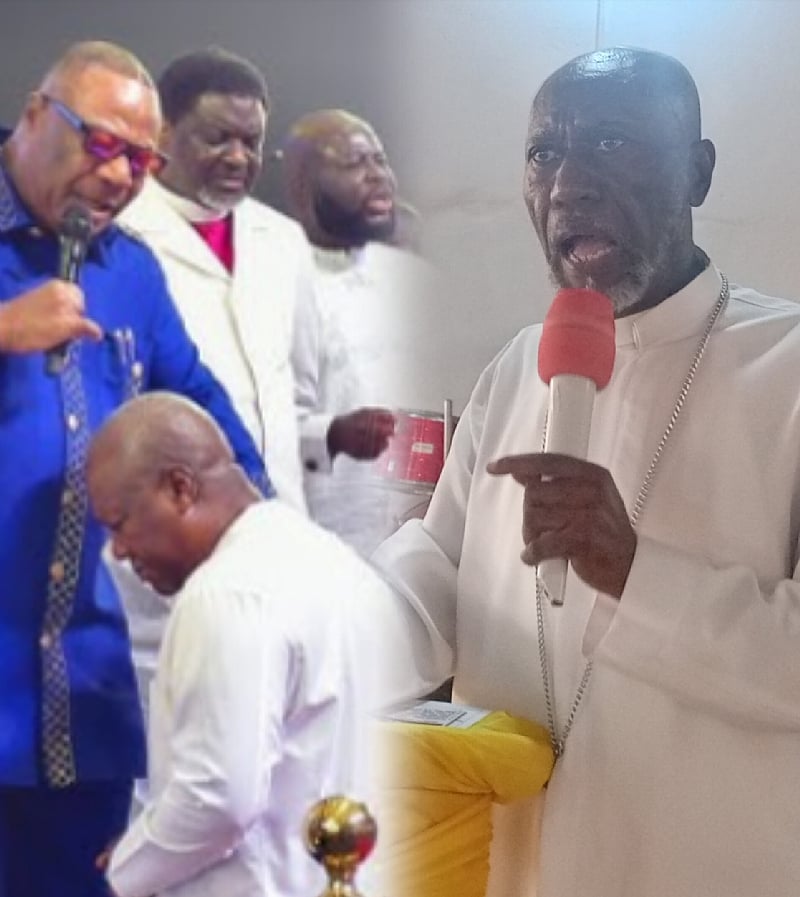The self-proclaimed spiritual architect of President John Dramani Mahama’s electoral victory, the General Overseer of Open Arms Ministry, St. Sark, launched a scathing attack on the President and prominent clergy for what he deemed a sacrilegious National Christian Thanksgiving service. St. Sark vehemently denounced the event held at the Ohene Konadu Auditorium at the University of Professional Studies (UPSA), arguing that its very location rendered it an abomination in the eyes of God. He spared no criticism for the participating clergy, including esteemed figures like Archbishop Nicholas Duncan Williams and Archbishop Charles Agyinasare, accusing them of harboring ulterior motives against the President and the National Democratic Congress (NDC), and even implicating them in occult practices. According to St. Sark, only he possessed the divine mandate to orchestrate such a service, and the President’s failure to heed this spiritual guidance had incurred divine displeasure.
At the heart of St. Sark’s grievance lies his conviction that he played a pivotal role in Mahama’s ascension to the presidency, a contribution he believes was profoundly undervalued by the choice of venue and the selection of officiating clergy. He insisted that the proper venue for the thanksgiving service was his own church auditorium at Open Arms Ministry in Bantama North Suntreso. This assertion of spiritual authority extends beyond mere location; St. Sark claimed exclusive rights to determine not only the venue but also the appropriate participants and date for such a significant spiritual undertaking. He depicted himself as the sole conduit for God’s favor towards Mahama and the NDC, casting the UPSA service as a gross miscalculation that failed to acknowledge his critical spiritual contributions.
St. Sark’s critique of the thanksgiving service extends beyond logistical and procedural disagreements; it delves into the realm of spiritual efficacy. He dismissed the corporate prayer led by Archbishop Duncan Williams, asserting that it was rejected by God due to the alleged impure motives of the participants. He went as far as to accuse prominent clergy members of occult involvement, painting them as adversaries of Mahama and the NDC, and blaming them for Ghana’s lack of progress. This sweeping condemnation of respected religious leaders underscores the depth of St. Sark’s conviction that the UPSA service was not just misplaced but spiritually detrimental.
The General Overseer’s pronouncements frame the thanksgiving service not as a gesture of gratitude but as a source of divine offense. He argued that the President’s actions in holding the service at UPSA had angered God, and that the only path to reconciliation lay in organizing another service under his specific direction. This demand for a repeat performance, strictly adhering to his prescribed parameters, highlights St. Sark’s unwavering belief in his unique spiritual authority. He presented himself as the ultimate arbiter of divine approval, positioning his church as the only acceptable venue for a genuine expression of gratitude to God for Mahama’s victory.
St. Sark’s pronouncements raise questions about the interplay of religion and politics, and the self-proclaimed authority of religious figures in the public sphere. His insistence on his own pivotal role in Mahama’s victory and his condemnation of established religious leaders represent a bold assertion of spiritual influence. By framing the thanksgiving service as a matter of divine judgment, he inserts himself into the political narrative, claiming a unique position of spiritual oversight. This raises questions about the boundaries of religious discourse and the potential for such claims to impact political processes.
Ultimately, St. Sark’s criticisms of the National Christian Thanksgiving service represent more than just a disagreement over logistics or protocol. They reflect a deeply held conviction of his own spiritual significance and his perceived role in Mahama’s political success. His pronouncements challenge the authority of established religious figures and highlight the complex relationship between religious belief and political action. By framing the issue in terms of divine approval and disapproval, he seeks to position himself as a key player in the spiritual and political landscape of Ghana.


